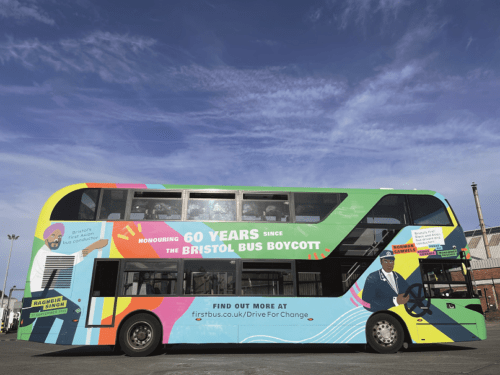
A key historic event involving the bus industry and race relations was commemorated in Bristol recently
A milestone moment in race relations history was honoured in Bristol on 30 August as one of the city’s historical events was commemorated. Local businesses, community groups, local residents and city leaders, including the region’s Metro Mayor and MP for Bristol West, came together to celebrate the 60th anniversary of the ‘Bristol Bus Boycott.’
The four-month boycott in 1963 was sparked after bus operators at the time introduced a new rule banning Black and Asian people from becoming drivers and conductors. In the 1960s, Bristol’s bus services were operated by Bristol Joint Services, owned by the Corporation of Bristol and the privately owned Bristol Omnibus Company, whose workers belonged to the Transport & General Workers’ Union.
In 1955, the local branch of the union passed a resolution to ban Black or Asian people from working as bus conductors and drivers. This policy was exposed by the Bristol Evening Post in 1961, sparking the launch of a new campaign group. Inspired by the events of the 1955 Montgomery bus boycott in Alabama, in which Rosa Parks and other community activists refused to give up their seats, a boycott of Bristol’s entire bus network began on 30 April 1963, lasting for four months. It ended in August 1963 when the Bristol Omnibus Company was finally forced to end its ‘colour bar.’ The campaign helped pave the way for the UK’s Race Relations Acts of 1965 and 1968.
The city marked this milestone moment with a number of events, including the unveiling of a specially designed double-decker bus by local illustrator and animator Alissa Thaler as part of a design competition run by First West of England. The new design, which will feature on the Bristol bus for at least the next 12 months, is dominated by the colours of the Jamaican flag in recognition of Guy Bailey, who was refused a job as a bus driver sparking the Bristol Bus Boycott.
His face, alongside other boycott pioneers, features on the bus, helping to tell the story from the arrival of the Windrush generation through to the boycott protests and subsequent introduction of the Race Relations Act 1965 and employment in Bristol of the city’s first Asian bus conductor Raghbir Singh and other drivers and conductors, including Norman Samuels, Norris Edwards, Abbas Ali and Mohammed Raschid.
A tour on the bus took place for local residents – including those closely associated with the boycott – of some of the city’s iconic black history locations, including the murals on Jamaica Street where passengers posed for a photo with a pop-up Bristol Bus Boycott 60th anniversary mural. A Caribbean brunch was held at St Mary Redcliffe Church followed by a public ceremony honouring and thanking the Bristol Bus Boycott pioneers, and a short procession took place recreating the boycott protests. On behalf of the people of Bristol, a thank-you card featuring 60 messages of thanks was presented to all of the Bristol Bus Boycott pioneers. Speakers from across the city shared their thoughts on what the boycott meant for Bristol, the rest of the country and the future of race relations.
The day’s events were part of a larger campaign dubbed Drive for Change to mark the boycott’s anniversary, and has been organised jointly by First West of England, Bristol Ideas, Creative Connex and Curiosity UnLtd.
Managing Director for First West of England Doug Claringbold said: “Today has been an important moment for Bristol; it has provided a very poignant reminder of the amazing battle the boycott pioneers fought to bring fairness to this city and its transport network. It was a truly milestone moment in our history, and it’s only fitting that we mark it in the way we have today. What the boycott pioneers did 60 years ago, along with those who stood in solidarity, shows what ground-breaking change we can achieve if we work together. I, on behalf of everyone, of every colour, at First Bus would like to thank you, from the bottom of our hearts, for making us a fairer and more inclusive society.”
Naomi Miller from Bristol Ideas added: “The Bristol Bus Boycott is a locally, nationally and internationally significant moment which deserves to be recognised, understood and celebrated by all of us, both in Bristol and beyond. It was a moment when ordinary Bristolians took a stand and changed the world around them. We can’t wait to see this beautiful bus sharing such an important story as it drives through the streets of our city, and hope it brings the public’s attention to this pivotal event in Bristol’s history.”
First Bus Driver Winston Reid observed: “The boycott was pivotal in the ethnic minority community, particularly the job seekers. It proved that people can come together to make a point and create change; it’s that change that made it possible for me to be a bus driver for First. Our ethnic mix workforce shows the positive outcome of that boycott, so I can truly say thanks to the organisers of the boycott and those who stood with them 60 years ago, thank you.”
First West of England Inspector Gary Sobers added: “I’m so grateful to the people who did the boycott, which has allowed me to be in the position I am now. As we become a more diverse company, it proves that the boycott worked and everyone integrated well.”

